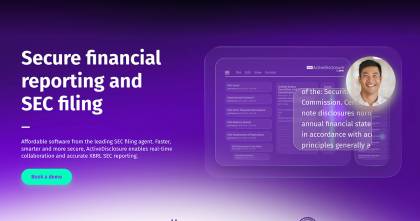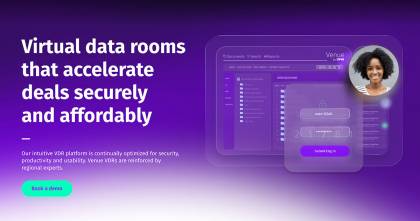Virtual data rooms (VDRs) are secure online environments that store confidential information necessary to complete the largest and most complex financial transactions. As speed and security become the two key metrics by which deals succeed or fail, virtual data rooms have become the backbone of most global transactions.
What makes a VDR different than other online file storing systems? VDRs offer a number of unique benefits that are required when undergoing complex transactions. Strict security and control permissions are available to ensure that each of the many parties that are granted access to the repository can be given specific levels of access and keeps unauthorized personnel from accessing highly confidential data, manipulating the data or copying the data for use outside of the data room. VDRs also have robust audit trails to monitor the actions of each participant in the VDR.
Virtual data rooms offer the convenience of online access with the strict privacy and security that deals require. They provide a wide range of features and are flexible to support various types of deals across all industries. They provide essential data protection in a wide range of situations, including mergers and acquisitions, fundraising, audits, licensing, and IP protection.
Why You Need a VDR in Today’s Market
The market is hot, and companies that are ready to go with a VDR have first mover advantage. When a VDR is waiting, your business can be ready and proceed with a deal without any delays that might cause you to lose advantage.
Smart virtual data rooms — such as DFIN Venue — offer simple setup to accommodate the speed necessary in today's hot market environment. Getting started in Venue is as easy as bulk uploading your sensitive documents. Organizing uploads with file folders enables seamless navigation during the due diligence phase. After the initial upload, Venue promotes fast deal-making through easy-to-understand workflows and features.
The security and responsiveness of a VDR have shifted expectations. Now, parties expect deals to proceed in a VDR. Using a VDR for high-stakes transactions provides companies with numerous benefits, such as gaining the first-mover advantage during M&As and financings. They provide bulk uploads and simplified workflows, making them faster, more efficient, and more secure than file sharing platforms.
Common Use Cases for VDRs
There are differences between an IPO and a SPAC/de-SPAC process. Mergers and acquisitions bring distinct structures. Yet virtual data rooms are used through the deal-making process, no matter what type of deal you are trying to make.
Regardless of the specifics, deals require a secure place to gather necessary documentation, perform due diligence and generate reports.
While this would have happened in a physical conference room in years past, now the reality is that most companies do the hard work online. They need a private, secure place to go, where everything is organized intuitively.
The VDR supports that role, but it isn't just used for deals. Virtual data rooms have also occurred in other uses, such as a virtual due diligence session. Other times when you might want a VDR include:
- Intellectual property management
- Fundraising
- Audits
- Clinical Trials
- Partnerships
- Licensing
- ESG reporting
- Regulatory submissions
- Cross-border financing
Core Capabilities of an Effective VDR
Not all virtual data rooms are created equal. Here are some of the most important virtual data room features to consider when shopping for a new VDR:
1. Safety and Security
Given the confidential nature of deal-making, data room security is top of mind. A secure virtual data room will keep backups in the cloud and off-site, so data can be recovered if anything is lost.
The best data rooms will have advanced security features that ensure strict adherence to AT 101 SOC 2 standards, such as:
- Regular penetration-testing with third-party evaluations
- 256-bit AES SSL encryption
- Automatic virus scanning
2. Control
Large teams play a role in deal-making, but not everyone on the team needs access to all features of the VDR. A good VDR will have access control features that enable you to set user permissions. This lets you control who has access to sensitive documents. People will also need the ability to edit, print, or save documents during the due diligence process. For transparency's sake, you may also wish to use watermarks that indicate who printed or downloaded a document. The right corporate VDR makes it simple to set and edit permissions throughout the lifecycle of the deal.
3. Ease of Use
A good VDR should be easy to use, so you aren't wasting valuable time trying to decipher it. The right VDR will also have strong support features, so you can get help when needed. Deals don't respect 9-to-5 hours. To stay on track, regardless of the curve balls that develop along the way, make sure that a virtual data room provider always offers 24/7/365 support.
4. Reporting and Custom Solutions
A strong VDR offers flexible solutions that cater to all industries and deal types, while supporting the development of comprehensive reports. Reporting features enable you to stay on track when juggling multiple deals on concurrent timelines. They also help you understand something critical to the success of the deal: knowing what the other side values most, so you can tailor discussions accordingly.
5. Artificial Intelligence
Think of the massive amounts of documentation that come together during the deal phase. Would you rather pay someone to manually review all documentation for comprehensiveness, or let AI machine do the work on your behalf? Not only can an AI check for errors such as duplicates or missing files, but it can also help you recall a phrase you saw somewhere with features such as full-text search.
VDR vs. File-Sharing Platforms
Deals require the exchange of sensitive information. If data were to get into the wrong hands, companies could be severely compromised.
While there are plenty of free document sharing options available on the market, these do not usually offer the robust level of security needed for high-profile deals, such as secure data encryption or audit trails. They also lack deal-specific tools such as NDAs, Q&A modules, dynamic watermarking and more. This is why companies often turn to virtual data rooms, rather than adopt existing cloud-based storage technology.
Security features to look for in a VDR include watermarking, 256-bit encryption, multifactor authentication, permissions control and invitation delays to prevent unauthorized access to confidential documents and baked-in infrastructure security. Venue offers all these features and more. Choosing Venue means companies can gain confidence that their deals will be handled in the most compliant manner, including meeting GDPR, CCPA, and SEC rules.
Who Uses VDRs and Why?
VDRs are used across a range of industries to support all kinds of deals. Roles most likely to interact with VDRs include executives, financial teams, analysts, compliance managers, and other professionals.
The virtual data room serves these users' needs through functions, such as:
- Due diligence
- Compliance, audits and regulatory reporting
- RFP & procurement
- Corporate project teams
- Legal firms and litigation
- Intellectual property management
- Portfolio reporting
Virtual data rooms can be used for deal management across a variety of industries, such as:
- Investment Banking
- Private Equity
- Oil & Gas
- Legal & Accounting
- Energy, Mining & Utilities
- Technology, Media & Communications
- Biotech, Health care & Pharmaceuticals
How to Select the Right VDR
If you’re still not sure which VDR platform is best for your business, it’s helpful to think about which features make the most sense for you. Among the most essential features your VDR software should have include compliance with SOC 2 and ISO 27001 security standards and an intuitive and easy-to-understand interface.
Beyond those, it’s also a good idea to look for deal-specific features such as financial due diligence designed for IPOs, real estate, and other elements that may be a factor in the deal. In terms of support capabilities, you should be on the lookout for VDR providers that offer 24/7 assistance, onboarding help and customized training programs.
Best Practices for Using a VDR
When integrating a VDR into its deal-making protocols, keep in mind a few pointers to maximize efficiency and security:
- Ensure the pre-upload structure features a standardized folder taxonomy to prevent confusion and misplaced documents.
- Use NDAs before providing individuals with access to keep sensitive information secure and protected.
- Review user permissions and access expiry on a regular basis so there are no loose ends during collaboration that could create a security risk.
- Audit file activity and use reporting insights to get the full picture of how the VDR is being used.
- Establish watermark and document expiry settings for comprehensive security and data hygiene.
- Train user teams including advisors as well as internal stakeholders to streamline the onboarding process and ensure users can hit the ground running.
The Future of Deals Is Virtual
While there are many benefits of virtual data rooms, it’s important to determine which features matter the most to your business in order to identify the best VDR partner. VDRs are a solution that can accommodate the robust due diligence needed to power M&As and move deals toward closing quickly. Learn more about how DFIN Venue can accelerate your next deal.

